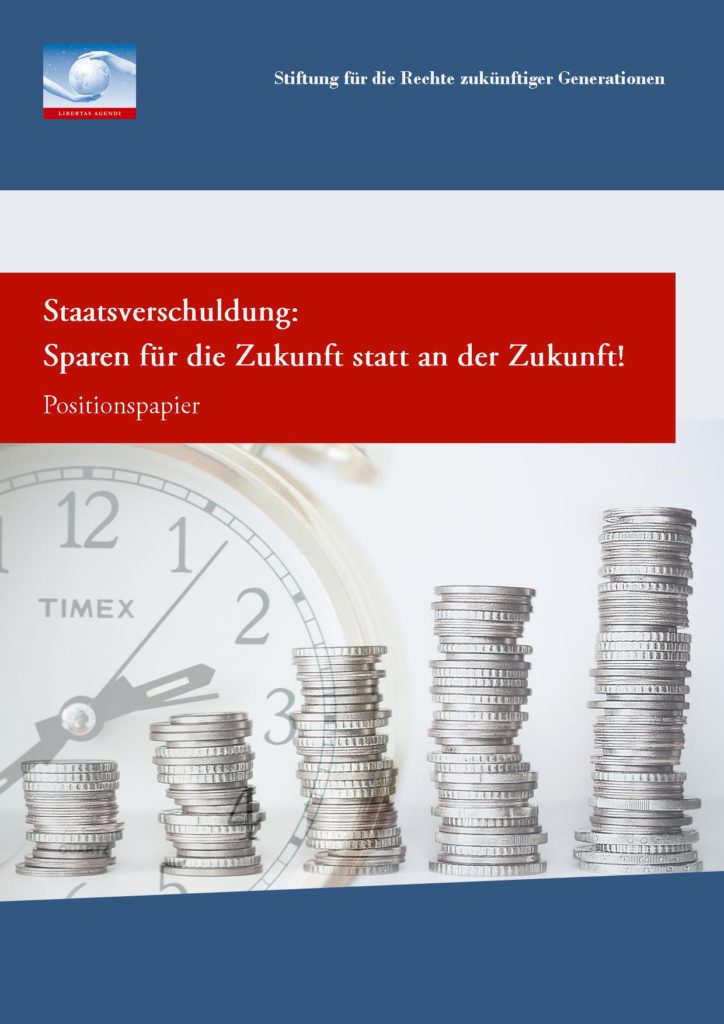Government debt is continuously growing, reaching record highs, from 18% of GDP in 1970 to more than 66% in 2008 and around 82% by 2011. Debt has never been higher in peacetime. Rising unemployment in the 1980s, German Unification in the 1990s and economic dislocation following the banking crash in 2008 have all played a role in raising government debt. Competition between parties has also led to rising debt. There are structural incentives for politicians to promise us more of future generations' money as the boost from extra spending is felt now but the interest paid later. Empirical studies in many democracies have shown that governments issue more debt when there are more parties in the coalition, when they find it harder to agree, when it seems as if they are likely to be voted out and when their time in office is short. The weaker a government the more likely it is to "buy" credibility funded by extra debt.

The consequences
High levels of public debt effectively redistribute money from the poor and the voiceless to the rich and the powerful. Interest paid by the taxpayer flows into the pockets of creditors with capital to lend. Succeeding governments have less and less money to spend – politics becomes less about changing society and more about managing decline.
Short-sighted management of the public finances today has to be paid for tomorrow. Inherited debts stop future governments from doing what they were elected to do. Discretionary spending has been coming down since the 1970s, i.e. governments have been spending less on their own policies and more on servicing debt and managing the long-term consequences of decisions made by previous governments. The deeper a country falls into a debt trap the more it is at the mercy of financial markets. Not majority decisions in legitimate parliaments but anonymous speculators in capital markets begin to determine the future of a country.
The aim
Management of the public finances which is just for future generations requires sharing out the debt burden equally. That doesn't have to mean paying down the entire public debt or taking on no more debt in the future. It means finding a way to reduce public debt through a combination of higher taxes and less spending.
A single generation must not be allowed to consume more than it produces. It should wherever possible leave things in a better state than how they found them. Money and public debt are not all that matter, there are other very important aspects like the environment.
The level of public debt taken doesn't say very much about how burdens are shared between the generations. The debt pile is easier to shoulder if, the economy consistently grows faster than the national debt, for instance. The ratio of debt to GDP or of interest payments to overall government spending are more useful indicators. But these are not perfect either. Interest payments, for example, can vary a lot from one year to another quite independently of the total amount of public debt. In 2002, the German government spent 14.9% of its budget on interest payments whilst the debt to GDP ratio consisted of 61% but it spent 10.9% in 2010 despite the total debt to GDP ratio having risen to 83%.
Public borrowing can also be intergenerationally just when it is used for investments which future generations will also profit from. This golden rule has nevertheless proven to be open to abuse; projects are sometimes justified merely based on the potential benefits they might bring future generations. But these "benefits" are often unclear, and the depreciation or declining utility of an investment over time is often not factored in, meaning that the real costs and benefits are often uncertain.
A second legitimate reason for taking on more public debt might be counter-cyclical spending, i.e. borrowing and spending during recessions to stimulate the economy. "Deficit spending" makes economic sense at the right time, but debts should be paid off when the economy takes off again. But experience has shown that politicians do a bad job of restraining spending and reducing debt even when times are good. Economic upturns instead seem to be another excuse to spend more money on target voters. Thus, recessions seem to always leave big piles of public debt in their wake.
Intergenerationally just public finances mean making smart savings on the one hand and raising taxes in the right way on the other. The "debt brake", introduced in 2009, has an important role to play here and the FRFG will pressure politicians to respect it.
The "debt brake" in the German constitution
In spring 2009, the German constitution was amended to include the "debt brake" which should ensure a balanced budget for structural spending (i.e. day-to-day long-term expenses as opposed to capital spending like investment in infrastructure). This is a great step in the right direction and the first serious measure which should restrain the public debt and force the government, the courts and regional parliaments to take future generations into account. The FRFG is keeping a close eye on the new "debt brake" and stands ready to offer criticism and advice when it is needed.


Read our German Position Paper
"Staatsverschuldung: Sparen für die Zukunft statt an der Zukunft!": A German Position Paper on the idea of setting aside resources and planning for what lies ahead, rather than spending or focusing on immediate or short-term concerns from September 2017.

